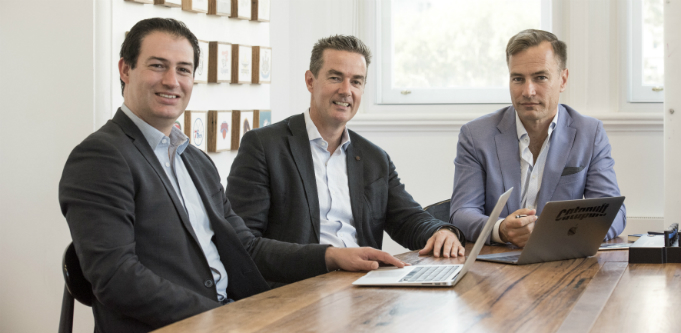
[Left to right] Catapult Group executive chair Dr Adir Shiffman, Joe Powell, Shaun Holthouse.
After growing Melbourne startup Catapult Group into an ASX-listed global tech brand, co-founder and chief executive Shaun Holthouse is bringing in a new leader to drive the venture through its next major growth phase.
Since launching the startup as Catapult Sports in 2006, Holthouse has grown it into a global company with a market capitalisation of over $325 million. It also boasts a global workforce of more than 200 employees and previously drew investment from US Shark Tank investor Mark Cuban.
From May 1, former Seek executive Joe Powell will become Catapult Group’s new chief executive while Holthouse moves into the newly created role of global head of strategy.
“It’s been a long conversation with the board and the management team over the last few years,” Holthouse says.
“Basically what our philosophy is is when you start a business, the decisions you have to make in the beginning are all sort of entrepreneurial ones.”
But as a company matures, Holthouse says the decisions across the chief executive’s desk change from figuring out brand identity, strategy, products and competitive advantage, to executing the business.
With Catapult Group’s revenue growing by 250% over the past year, Holthouse believes the chief executive role has reached a “tipping point” where challenges and key decisions have really shifted from entrepreneurial ones to operational.
“There’s been a big step up in our revenue [and] a big step up in staff numbers,” he says.
“At some stage there’ll be a point in the company’s development where if you bring on someone that’s just an expert at the next stage of growth, you’ve got a real chance [at greater success].”
While Holthouse says there continues to be “enormous growth potential” in Catapult’s core market of elite sports teams, the company is also “moving into consumer business opportunities” with its performance tracking technology.
Letting go of the reins
For some entrepreneurs, the decision to hand over control of their business would be a daunting one. But Holthouse says bringing in a new chief executive “feels like an easy decision”.
“Founders have big egos otherwise they wouldn’t have started a business … I’m no different to be truthful,” says Holthouse.
“It just so happens that my ego doesn’t need to be served by being the CEO forever.”
Instead, Holthouse says he’s happy with being the architect and creating something from scratch that has real traction and value.
And quite frankly, Holthouse says he’d like “to get really rich in the process” so doing what’s best for the business is a priority.
Choosing the right leader
But bringing a new leader into a growing business is not a process that should be rushed, says the entrepreneur.
“Finding a new CEO is the most important recruitment process an organisation can go through,” says Holthouse.
“We wanted to really deeply know the candidate we were thinking of appointing. I’ve been talking to Joe for more than a year.”
During this time, Powell was brought on as an advisor and Holthouse had long discussions with him about strategy, culture, values and other operational issues, including executive structure.
“We couldn’t know him better as a candidate,” he says.
“In some ways, it’s a risky process … he’s getting offers left, right and centre [but] we took this really patient approach.”
Powell said in a statement he’s looking forward to the “tremendous” opportunity.
“When you consider the potential for Catapult to extend leadership in elite sports to the adjacent sub-elite and consumer markets, the growth opportunity is enormous,” Powell said.
“That’s similar to the strategy Seek has pursued with such success — leveraging a global footprint and leadership in a core category to drive growth in adjacent markets.”
Follow StartupSmart on Facebook, Twitter, LinkedIn and iTunes.


COMMENTS
SmartCompany is committed to hosting lively discussions. Help us keep the conversation useful, interesting and welcoming. We aim to publish comments quickly in the interest of promoting robust conversation, but we’re a small team and we deploy filters to protect against legal risk. Occasionally your comment may be held up while it is being reviewed, but we’re working as fast as we can to keep the conversation rolling.
The SmartCompany comment section is members-only content. Please subscribe to leave a comment.
The SmartCompany comment section is members-only content. Please login to leave a comment.